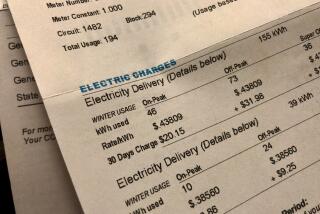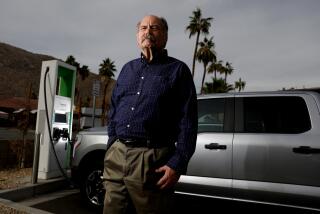Power to the People? Empower the Regulators
- Share via
It is risky to sound off about this sudden and eerie shortage of electricity in the land.
If, on one hand, you brush up on all the details, you end up babbling in wonk-talk like an engineer or an economist. If, on the other, you react from the gut, the wonks regard you as a numskull.
Given that choice, I’m inclined to change the subject.
So let’s stand back and look at deregulation, and not just in the delivery of kilowatts, but across the broad sweep of basic services. Deregulation has run its course.
Politicians, naturally, find themselves way out of step on this matter by virtue of their wholehearted investment in deregulation and the corresponding cash investment of deregulated entrepreneurs in politicians. But that will eventually right itself.
I wonder, who will be made to suffer and for how long?
Regulation and deregulation are, for society, like the two stages of breathing. In, out. Regulate, deregulate. That’s how the country keeps oxygen in the system.
Right now, we’re being asked to hold our breath, and it’s beyond uncomfortable.
I am surprised that so many otherwise intelligent leaders speak of the energy crisis in the West as a consequence of “bad” deregulation--as if to suggest that we need more deregulation, just of a better kind. Really what has happened is that deregulation has become a social tyrant just like regulation had become before it.
Let’s remember back to when regulation worked. Was it so bad, really? Truck drivers were the princes of the highways; they would flash their lights when it was OK to pass. Airlines actually seemed to work. When you made a reservation for an 8 a.m. flight, you pretty much knew that you’d be boarding without a scrum, getting a bite to eat and allowed to stretch out before the long day ahead.
As for telephones, you didn’t have to play silly sweepstakes games to pick a company. You could get an operator on the line, the phones worked reliably, even if there weren’t so many fancy models to choose from.
If you got injured on the job, you knew the regulated system of workers’ compensation insurance would step in and help you avoid bankruptcy.
Plus, when you drove home from work you didn’t have to worry about whether there would be juice to power the traffic signals.
Then, a generation ago, we came to see our system as stifled. Regulators are not dreamers, and the nation was in a mood to dream big. Regulators became obstacles to unleashing creativity in commerce. So we breathed out and gave the market the upper hand. Fair enough.
But what are the obstacles today?
The market dreamers and schemers have had their say, and their America is now as stifled as it ever was at the hands of regulators, and irritatingly unpleasant to boot. If we believe those who talk the language of the electricity engineers, we are headed for much worse this summer. Who among us has a job that doesn’t depend on electricity?
Or, take telephone service. It’s a mess. A relatively minor earthquake in Seattle shuts down long-distance through a whole region of the country. Meanwhile, depending on which “provider” you have signed up with and how many shortcuts they’ve taken, a call to information will give you my phone number from any of three addresses that I’ve lived at during the past five years.
But what about the savings and innovations?
I’m not sure that innovations wouldn’t have occurred anyway, and more sensibly. After all, our unregulated competition over formats has put us behind the regulated Europeans in wireless technology. As for savings, I have a suspicion they accrue chiefly to those with the time and the stomach to play the bizarre coupon puzzles that phone companies use as loss-leaders. As for the rest of us, I’m not so sure. Are you? I know only that I’m hounded by ill-timed phone calls and stacks of mail inviting me to decipher the fine print.
What about choices? Personally, I’d choose to have my telephone work and to know that I’m getting what I pay for, not what I play for. I’ve got other things to do with my time.
You can see the same in the trucking industry. The cutthroat competition brought on by deregulation has turned decent people into road warriors, some of the most feared and frazzled workers in the country.
And airlines? Need we enumerate the humiliations, the wholly unfair pricing schemes, the decay in service and civility?
What about workers’ compensation insurance? The Times’ Virginia Ellis reported this week that the 1993 deregulation of employer insurance rates led to a short-term bonanza for business, but now workers face a possible future in which insurance companies have too few assets to pay claims for those injured on the job.
Overall, deregulation is a mess. “The inefficiencies that were talked about in our old system were inefficiencies of excess capacity. Now, excess capacity is gone. Are we happier?” asks Carl Pope, executive director of the Sierra Club.
Somebody is profiting and the rest of us are paying. I’d rather not have to take a crisis course in engineering or economics or insurance to sort it out. Give us a few good regulators with sharp teeth. Get ‘em starting on restoring the basics for the good of us all.
Thomas Jefferson once remarked, “The art of life is the art of avoiding pain.” He could have been referring to the first duty of government. It’s time to breathe in again.


